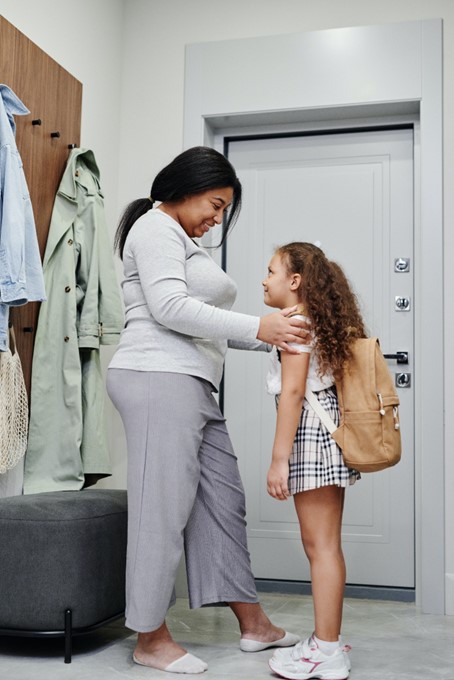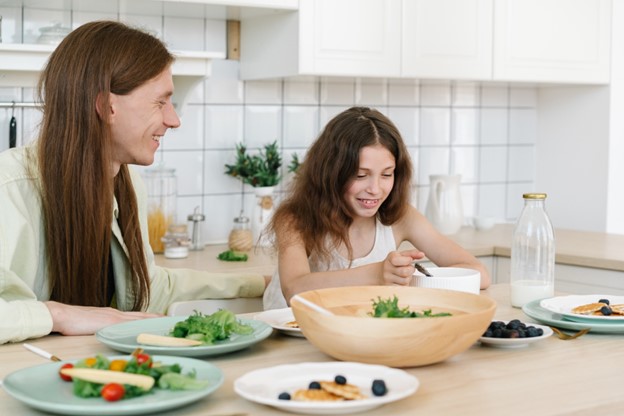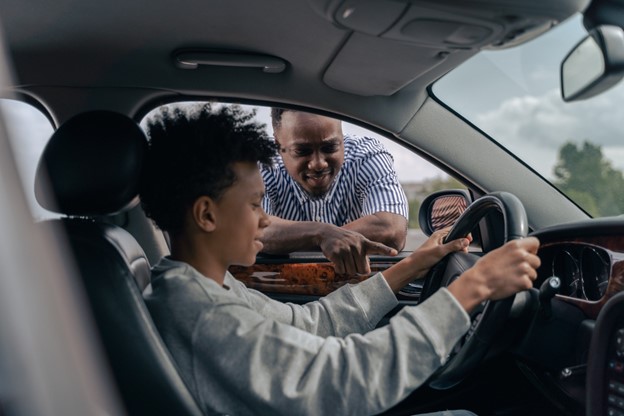
When should I start talking to my child about alcohol and marijuana?
Parent/child discussions about alcohol and other drugs have been shown to be effective at reducing a child’s chances of later developing a substance abuse issue when begun as early as age 9.
This may seem young, but many young people start drinking before age 15. Thirty-three percent of eighth graders in the United States said they tried alcohol at some time in their lives, and 65 percent of teens who do drink reported that they get drunk in a typical month (SAMHSA).
Parent conversations with their kids are critical and the leading influence on whether a teen chooses to
drink.

How can I talk to my child about alcohol and marijuana?
Here are some things to keep in mind when talking to your child about alcohol, marijuana, and other substances. These conversations are most effective when they are kept short, casual, and repeated often.
● DO show your teen you are not OK with underage drinking or substance use.
● DO show you care about your child’s health, wealth, and success – children are more likely to listen when they know you are on their side; be sure they know you want them to be happy and safe.
● DO show you are a good source of information about alcohol and other drugs – you want your child to make informed decisions, so you want to provide them with reliable information. Remind them that not all sources of information are trustworthy.
● DO show you are paying attention – children are more likely to engage in risky behaviors if they think no one is watching. Be involved and observant, without prying or invading their privacy.
● DO encourage your child to build their own skills and strategies to avoid substance misuse – have a plan to help your child avoid peer pressure when you’re not around. Practice ways to casually say “no thank you.”
● DO set a good example – even during their rebellious teenage years, your child is watching you. Drink responsibly. Demonstrate good habits, like calling for a ride home if you’re feeling tipsy after drinks with friends.
● DO keep your home open as a safe haven – Make sure your child and their friends know they can leave a risky situation and come home at any time and that you are a safe, trusted person to talk to. This does not mean allowing your child to consume alcohol or other drugs at home.
● DO talk about alcohol, marijuana, illegal drugs, and prescription and over-the-counter medications – many children (and plenty of adults) don’t know that even over-the-counter medications can cause impairment. Make sure your child knows not to operate a vehicle when they feel foggy.
● DON’T shame your child – No, you don’t want them to misuse alcohol or drugs, and you don’t want to allow it under your roof. But you do want your child to know that they can call you if they’ve made a mistake. Show that you care about them, and avoid talking down to them.
● DON’T assume your child is immune to alcohol or drug misuse.
● DON’T engage in behaviors you wouldn’t want your child to imitate.

How can I prevent my child from driving impaired?
As with all parent/child conversations about substance use, prevention is key. Talk about it early and often.
● Set rules and explain consequences – Explain to your teenagers that they are not to drink alcohol at all, especially if they plan to drive. Make sure that they know it is illegal for anyone under the age of 21 to drive with any trace of alcohol in his or her body. Alcohol and drug use can affect their health, academics, relationships, sexual safety, and finances – the average cost of a first DUI in Colorado is now $13,530 (NoDUIColorado).
● Have a plan – Make sure your child knows they can contact you if they ever feel unsafe and need to be picked up. Some families even set up a code phrase your child can text to a parent if they are experiencing peer pressure. Then, you can call with a “family emergency,” and your child can leave without worrying about what their peers might think.
● Suggest alternatives – Come up with a list your child and their friends enjoy of alternate activities to avoid situations with lots of pressure to drink or use drugs.
● Set an example – Always drive responsibly. Your child is watching you.
Make the Right Call – your children are counting on you. Follow No DUI Larimer on Facebook, Instagram, and Pinterest for more ways you can combat impaired driving in our community.
Our campaign is encouraging the public to “Make the Call” to end impaired driving in our community. Make the Call to get a safe ride home. Make the Call about whether you should get behind the wheel, and Make the Call to report suspected impaired drivers. Driving under the influence IS an emergency–please call 911 if you see someone you suspect is driving impaired.

![Partners [Logo Reversed]](https://poweredbypartners.org/wp-content/uploads/2020/06/partners-horiz-no-tag-sm-rgb-color-purple.png)